In the weeks following the assassination of Haiti's president and subsequent political unrest, the U.S. issued a notice allowing Haitians in the U.S. the chance to apply for temporary protected status.
Six weeks later, President Joe Biden approved the swift mass deportation of thousands of Haitian migrants that had gathered at the southern border -- without offering the chance to apply for asylum.
The expulsions were justified under Title 42, a Trump-era COVID-19 policy that allows for deportations of migrants without allowing the chance to apply for asylum - a policy Biden has extended.
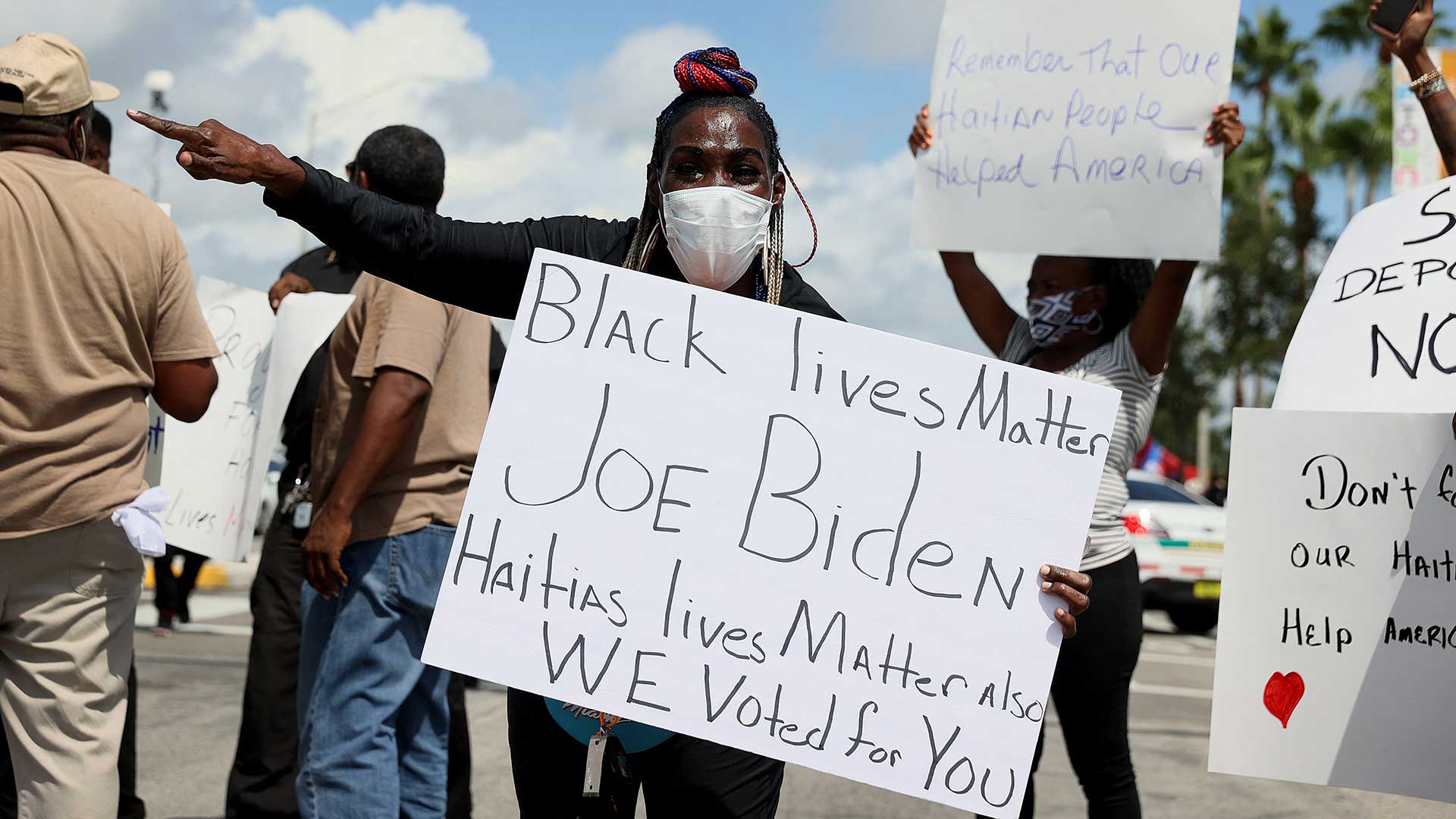
Protesters join together in front of a USCIS Building to denounce the expulsion of Haitian refugees from Del Rio, Texas on September 22, 2021 in Miami, Florida. Thousands of mostly Haitian immigrants are in limbo on the U.S. Mexico border at Del Rio, Texas. U.S. immigration authorities have been deporting some of them directly to Haiti. (Joe Raedle/AFP)
Protesters join together in front of a USCIS Building to denounce the expulsion of Haitian refugees from Del Rio, Texas on September 22, 2021 in Miami, Florida. Thousands of mostly Haitian immigrants are in limbo on the U.S. Mexico border at Del Rio, Texas. U.S. immigration authorities have been deporting some of them directly to Haiti. (Joe Raedle/AFP)

United States Border Patrol agents on horseback try to stop Haitian migrants from entering an encampment on the banks of the Rio Grande near the Acuna Del Rio International Bridge in Del Rio, Texas on September 19, 2021. (Photo by PAUL RATJE / AFP)
United States Border Patrol agents on horseback try to stop Haitian migrants from entering an encampment on the banks of the Rio Grande near the Acuna Del Rio International Bridge in Del Rio, Texas on September 19, 2021. (Photo by PAUL RATJE / AFP)
Iran
As a presidential candidate, Biden criticized predecessor Donald Trump for leaving the Iran Nuclear Deal writing that as president he would "set Iran policy right" and offer Iran a "credible path back to diplomacy" in a CNN editorial.
But in his nine months in office, the Biden administration has not been able to restore the deal, with critics citing U.S. attempts to "lengthen and strengthen" it beyond the original agreement as a main reason behind stalled negotiations.
Biden has also refused to lift harsh sanctions on Iran that were imposed by Trump after he pulled the U.S. from the deal.
Those sanctions have prevented companies around the world from trading with Iran across all major sectors and has decimated the Iranian economy, which shrank from $46 billion in 2019 to $28 billion in 2020.
In his speech to the United Nations on Tuesday, Iranian President Ebrahim Raisi called U.S. sanctions a "new way of war with the nations of the world" and said maintaining such polices during the global pandemic constituted "crimes against humanity."
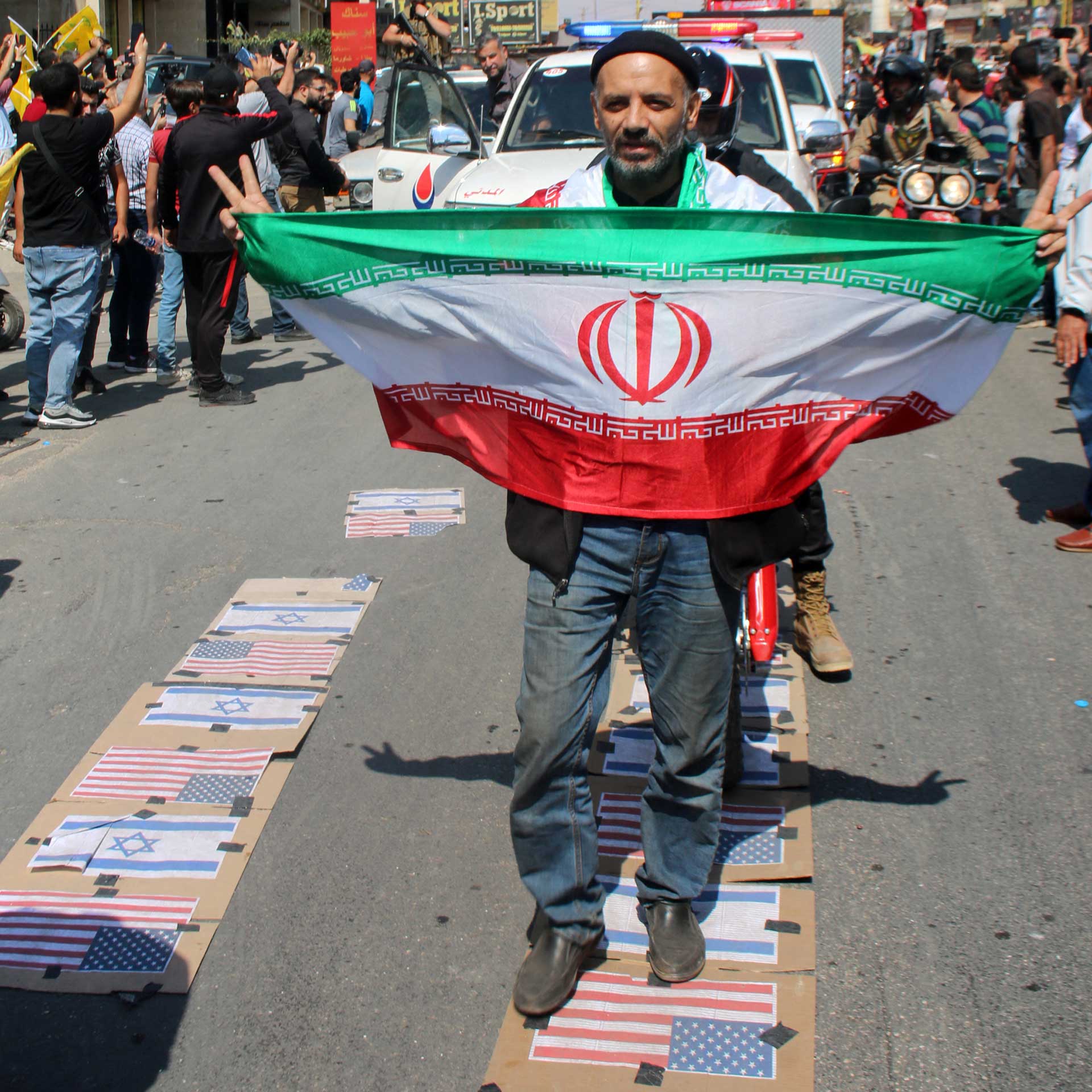
A man carrying an Iranian flag steps of US flags, as people gather to welcome tankers carrying Iranian fuel, upon their arrival from Syria in the city of Baalbeck, in Lebanon's Bekaa valley, on September 16, 2021. - Dozens of tankers carrying Iranian fuel and transported by the Shiite Hezbollah movement arrived from Syria in Lebanon, in the grip of severe fuel shortages. (Photo by AFP)
A man carrying an Iranian flag steps of US flags, as people gather to welcome tankers carrying Iranian fuel, upon their arrival from Syria in the city of Baalbeck, in Lebanon's Bekaa valley, on September 16, 2021. - Dozens of tankers carrying Iranian fuel and transported by the Shiite Hezbollah movement arrived from Syria in Lebanon, in the grip of severe fuel shortages. (Photo by AFP)
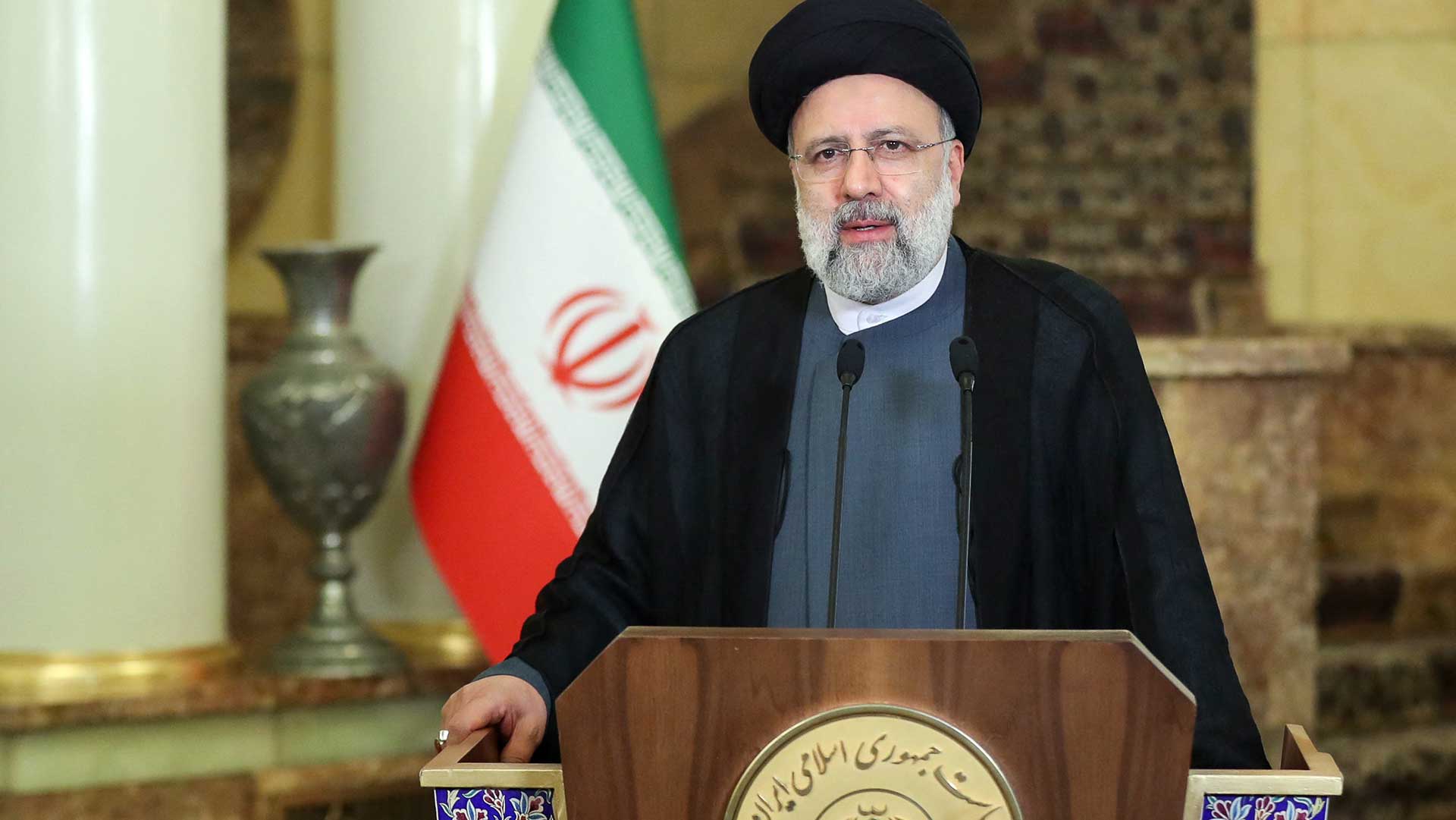
A handout picture provided by the Iranian presidency on September 21, 2021 shows Iranian President Ebrahim Raisi addressing the 76th Session of the UN General Assembly from Tehran. Raisi told the United Nations that he supported talks on the 2015 nuclear deal if they led to an ending of US sanctions. (Photo by HO / Iranian Presidency / AFP)
A handout picture provided by the Iranian presidency on September 21, 2021 shows Iranian President Ebrahim Raisi addressing the 76th Session of the UN General Assembly from Tehran. Raisi told the United Nations that he supported talks on the 2015 nuclear deal if they led to an ending of US sanctions. (Photo by HO / Iranian Presidency / AFP)
Cuba
The sanctions aren't limited to Iran. In Cuba, Biden has maintained Trump policies and added more sanctions to the decades-long embargo on Cuba that began during the Cold War.
In June, the United Nations voted to approve -- for the 29th year in the row -- an end to the U.S. economic blockade on Cuba. The only two no votes were the U.S. and Israel.
Biden has even said that more sanctions on Cuba are to come, in a turn from former President Barack Obama's Cuban rapprochement policies.
"One of the cruelest aspects of America’s sanctions policy is that it is so readily deployed because it satisfies special interest groups in Washington and is painless to Americans, but inflicts horrific damage on the poorest and most powerless — millions of ordinary Cubans and Iranians — who have no way to protest or respond," writes Washington Post Columnist Fareed Zakaria.

A nurse who works at a hospital in the sugar zone hitchhikes back home, in Madruga, Cuba, Thursday, April 29, 2021. Once known as the Sugar Bowl of the World, production is at an all-time low with more restrictive U.S. sanctions affecting everything, including transport, fuel, as well as securing spare parts for the mills to scaring away those who were once big clients. (AP Photo/Ramon Espinosa)
A nurse who works at a hospital in the sugar zone hitchhikes back home, in Madruga, Cuba, Thursday, April 29, 2021. Once known as the Sugar Bowl of the World, production is at an all-time low with more restrictive U.S. sanctions affecting everything, including transport, fuel, as well as securing spare parts for the mills to scaring away those who were once big clients. (AP Photo/Ramon Espinosa)
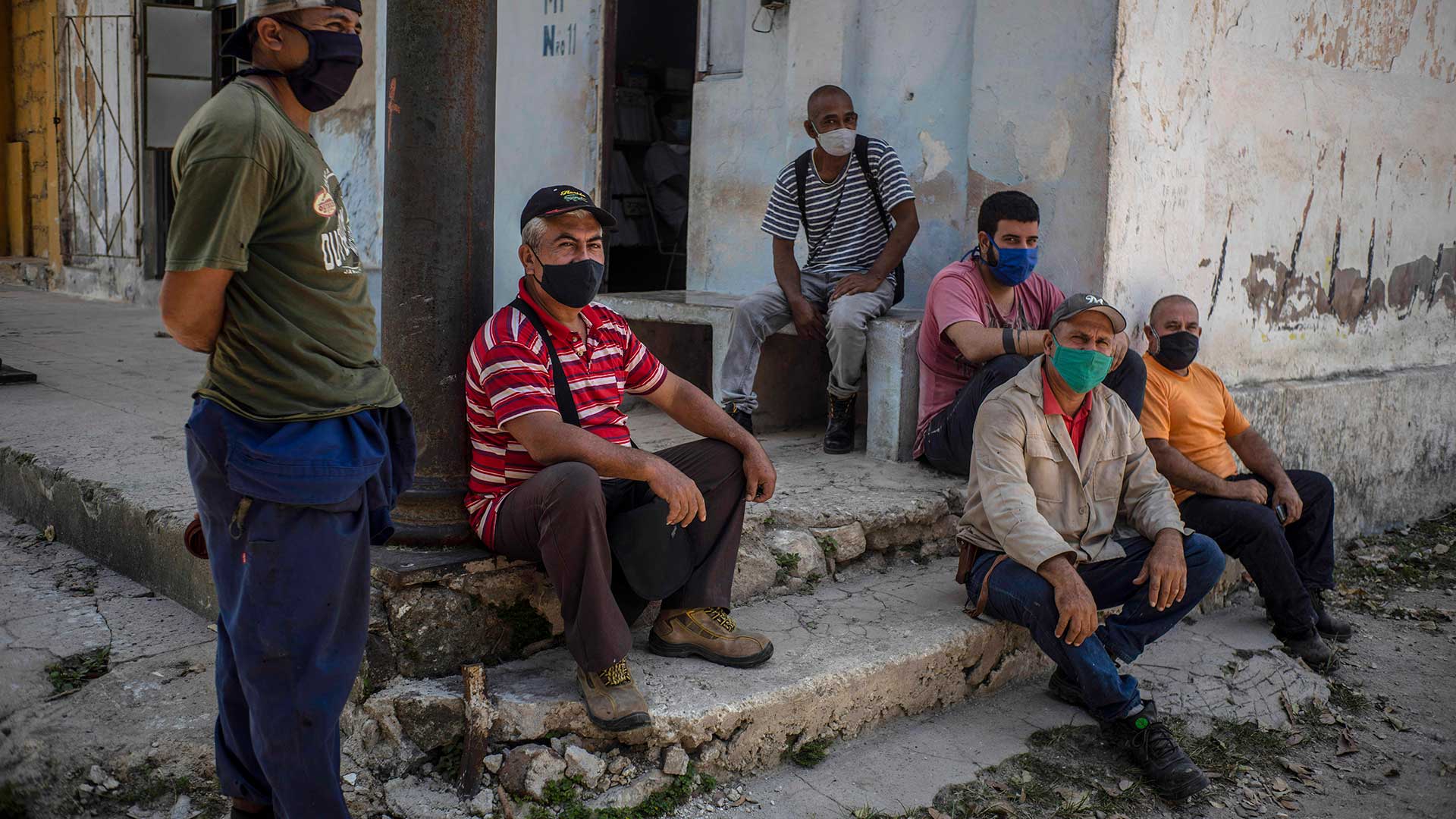
Employees sit outside their factory where work stopped due to lack of fuel at the Boris Luis Santa Coloma sugar mill, in Madruga, Cuba, Thursday, April 29, 2021. Once known as the Sugar Bowl of the World, production is at an all-time low with more restrictive U.S. sanctions affecting everything, including transport, fuel, as well as securing spare parts for the mills to scaring away those who were once big clients. (AP Photo/Ramon Espinosa)
Employees sit outside their factory where work stopped due to lack of fuel at the Boris Luis Santa Coloma sugar mill, in Madruga, Cuba, Thursday, April 29, 2021. Once known as the Sugar Bowl of the World, production is at an all-time low with more restrictive U.S. sanctions affecting everything, including transport, fuel, as well as securing spare parts for the mills to scaring away those who were once big clients. (AP Photo/Ramon Espinosa)
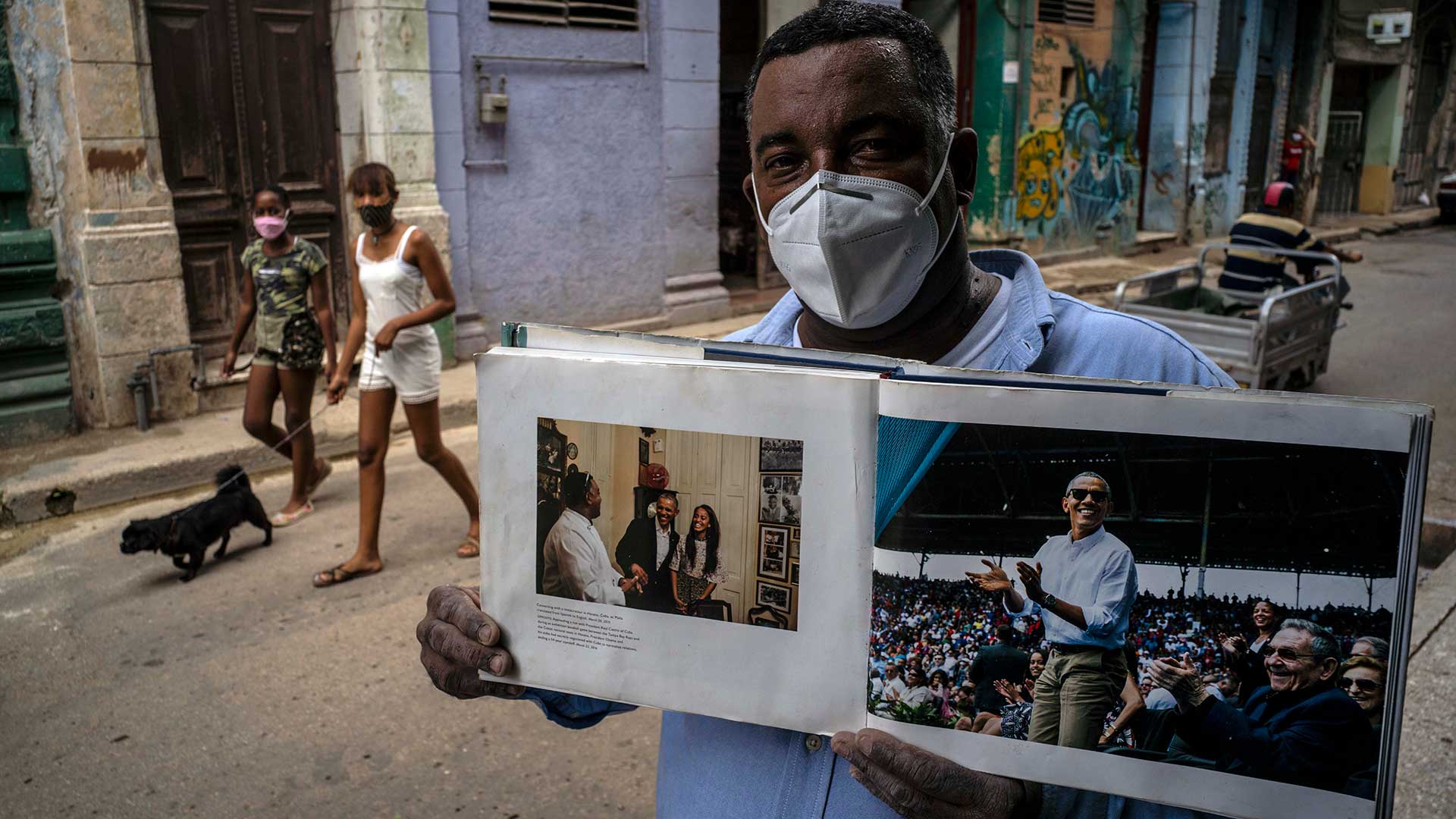
Cristobal Marquez, owner of "Cristobal's," the restaurant where Michelle and Barak Obama had lunch during their visit to Cuba in 2016, shows the book made by White House photographer Pete Souza, in Havana, Cuba. Joe Biden was part of an administration that reestablished diplomatic ties with Cuba, loosened travel restrictions and made it easier for Cubans in the United States to send money home. As president, Bidenhas so far not lifted sanctions on Cuba. (AP Photo/Ramon Espinosa, Oct. 22, 2020 file photo)
Cristobal Marquez, owner of "Cristobal's," the restaurant where Michelle and Barak Obama had lunch during their visit to Cuba in 2016, shows the book made by White House photographer Pete Souza, in Havana, Cuba. Joe Biden was part of an administration that reestablished diplomatic ties with Cuba, loosened travel restrictions and made it easier for Cubans in the United States to send money home. As president, Bidenhas so far not lifted sanctions on Cuba. (AP Photo/Ramon Espinosa, Oct. 22, 2020 file photo)
And then there's China
Biden has so far retained all the tariffs on Chinese goods that Trump put in place, even extending some, arguing that China hasn't lived up to the phase one trade deal brokered between China and the U.S. meant to reign in the trade war. This, despite the urging of dozens of U.S. trade groups that have appealed to the Biden administration to resume negotiations and get rid of tariffs that they say harms the U.S. economy.
In his first major speech as U.S. Secretary of State, Antony Blinken said the biggest geopolitical test of the 21st century is the U.S. relationship with China.
"China is the only country with the economic, diplomatic, military, and technological power to seriously challenge the stable and open international system – all the rules, values, and relationships that make the world work the way we want it to, because it ultimately serves the interests and reflects the values of the American people," Blinken said.
Blinken added that the U.S. China relationship will be "competitive when it should be, collaborative when it can be, and adversarial when it must be."
To achieve U.S. goals on China the U.S. will work with "allies and partners" so that the "combined weight is much harder for China to ignore," Blinken said.
To this end, the U.S. has elevated the Quadrilateral Security Dialogue -- comprised of Australia, India, Japan and the U.S. -- as a strategy to compete with China.
An in-person meeting of "Quad" nations is set to take place this week in Washington.
Many have compared this alliance to an "Asian NATO", spurring Japanese Prime Minister Yoshihide Suga to say that Japan's involvement was not "targeting any specific country."
"We think it is possible to cooperate with any country that shares the vision. And there is no intention at all to create an Indo-Pacific version of NATO,” he said last October.
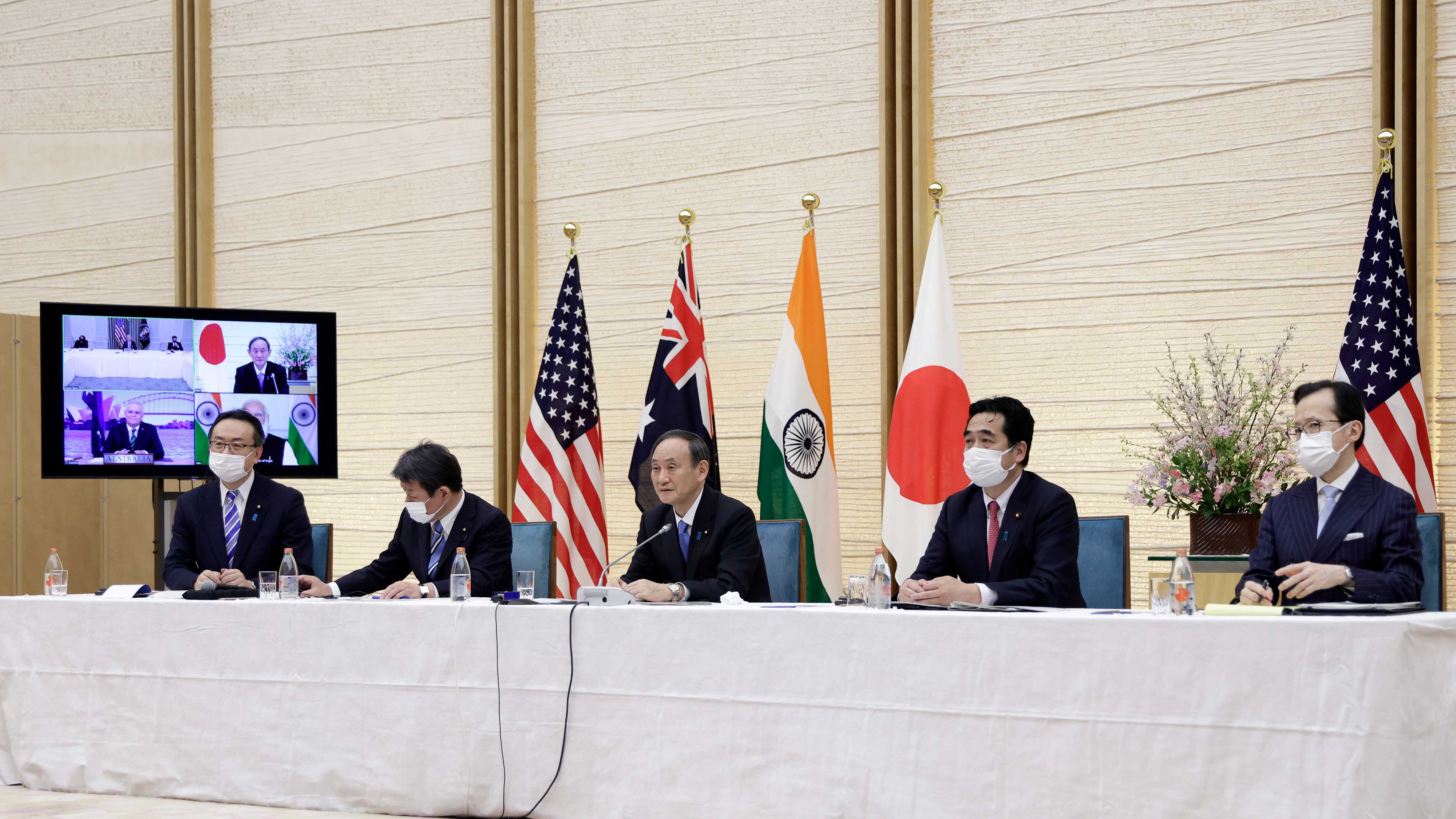
Yoshihide Suga, center, speaks during the virtual summit of the leaders of Australia, India, Japan and the U.S., a group known as “the Quad", at his official residence in Tokyo, Japan, on Friday, March 12, 2021. (Kiyoshi Ota/Pool via AP)
Yoshihide Suga, center, speaks during the virtual summit of the leaders of Australia, India, Japan and the U.S., a group known as “the Quad", at his official residence in Tokyo, Japan, on Friday, March 12, 2021. (Kiyoshi Ota/Pool via AP)
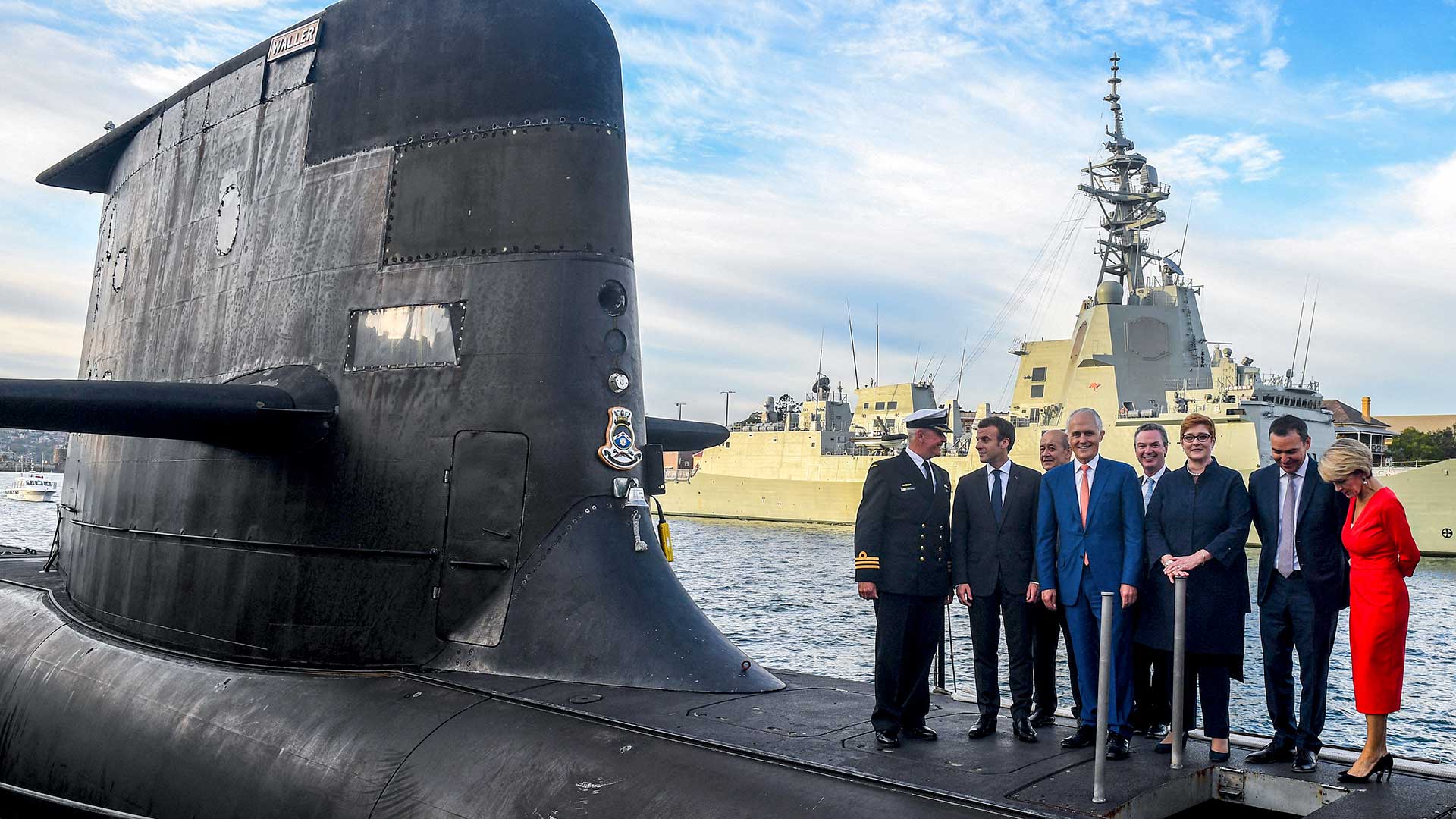
A file photo taken on May 2, 2018 shows French President Emmanuel Macron (2/L) and Australian Prime Minister Malcolm Turnbull (C) standing on the deck of HMAS Waller, a Collins-class submarine operated by the Royal Australian Navy, at Garden Island in Sydney. - Australia is expected to scrapped a 66 billion USD deal for France to build submarines, replacing it with nuclear-powered subs using US and British technology. (Photo by BRENDAN ESPOSITO / POOL / AFP)
A file photo taken on May 2, 2018 shows French President Emmanuel Macron (2/L) and Australian Prime Minister Malcolm Turnbull (C) standing on the deck of HMAS Waller, a Collins-class submarine operated by the Royal Australian Navy, at Garden Island in Sydney. - Australia is expected to scrapped a 66 billion USD deal for France to build submarines, replacing it with nuclear-powered subs using US and British technology. (Photo by BRENDAN ESPOSITO / POOL / AFP)
The U.S. also plans to host a Summit for Democracy in December, to "renew the spirit and shared purpose of the nations of the Free World."
The website for the summit says it will ask private sector tech giants to commit to preserving democratic societies and free speech and not empower China.
In another escalation, the U.S., Australia and the United Kingdom announced the AUKUS pact last week to aid Australia in developing nuclear-power submarines in the Pacific.
"The United States did not directly mention China in announcing its historic new security partnership with Australia and Britain last week, but it didn’t have to. The defense deal is a clear escalation and indication that Washington views Beijing as an adversary," writes Sam Roggerveen in a New York Times opinion essay.
China has said the pact would undermine peace and stability.
The pact would also aggravate the arms race and impair international nuclear non-proliferation efforts, Chinese Foreign Ministry Spokesman Zhao Lijian said.
"The three countries should discard the Cold War zero-sum mentality and narrow geopolitical perspective, follow the trend of the times for peace and development, and stop forming exclusive blocs or cliques," Zhao said.
The pact also had the consequence of offending France, which had already signed an agreement with Australia for nuclear-powered submarines, so much so, that France recalled its ambassadors to the U.S. and Australia.

Chinese President Xi Jinping addressed the United Nations General Assembly on Tuesday.
Chinese President Xi Jinping addressed the United Nations General Assembly on Tuesday.
In his pre-recorded address to the United Nations General Assembly on Tuesday, Chinese President Xi Jinping said that China does not seek hegemony.
"Differences and problems among countries, hardly avoidable, need to be handled through dialogue and cooperation on the basis of equality and mutual respect. One country’s success does not have to mean another country’s failure, and the world is big enough to accommodate common development and progress of all countries." Xi said.
"China has never and will never invade or bully others, or seek hegemony. China is always a builder of world peace, contributor to global development, defender of the international order and provider of public goods. China will continue to bring the world new opportunities through its new development."
New Cold War?
To China, Biden's policies show that U.S.-China relations are no different under Biden than under Trump and seems to be heading towards a new Cold War, experts say.
"From the Chinese perspective, many of the Biden administration’s recent moves indicate that a new anti-China Cold War is imminent," writes Cheng Li of the Brookings Institution.
"The now well-known comment by China’s top diplomat, Yang Jiechi, to his American counterparts–– 'we thought too well of you'–– has reaffirmed the widespread sentiment in China prior to the Anchorage dialogue that 'there is no essential difference between the Biden team and the Trump team,'" Li writes.
United Nations Secretary-General Antonio Guterres characterized the U.S. China relationship ahead of the UN General Assembly high-level meetings this week as "completely dysfunctional" citing the AUKUS pact as a factor.
“We need to avoid at all cost a Cold War that would be different from the past one, and probably more dangerous and more difficult to manage,” Guterres said.
During Biden's first speech to the UN on Tuesday, he assured: ...we’re not seeking — I'll say it again — we are not seeking a new Cold War or a world divided into rigid blocs.
"We've ended 20 years of conflict in Afghanistan. And as we close this period of relentless war, we're opening a new era of relentless diplomacy," Biden said.
Biden has said he would like to hold face-to-face talks with China, but so far nothing has been announced.
If China and the U.S. don't meet by October, it would be the longest time before a new U.S. president met his Chinese counterpart since 1997.
Check out The China Report, our new weekly newsletter. Subscribe here!

